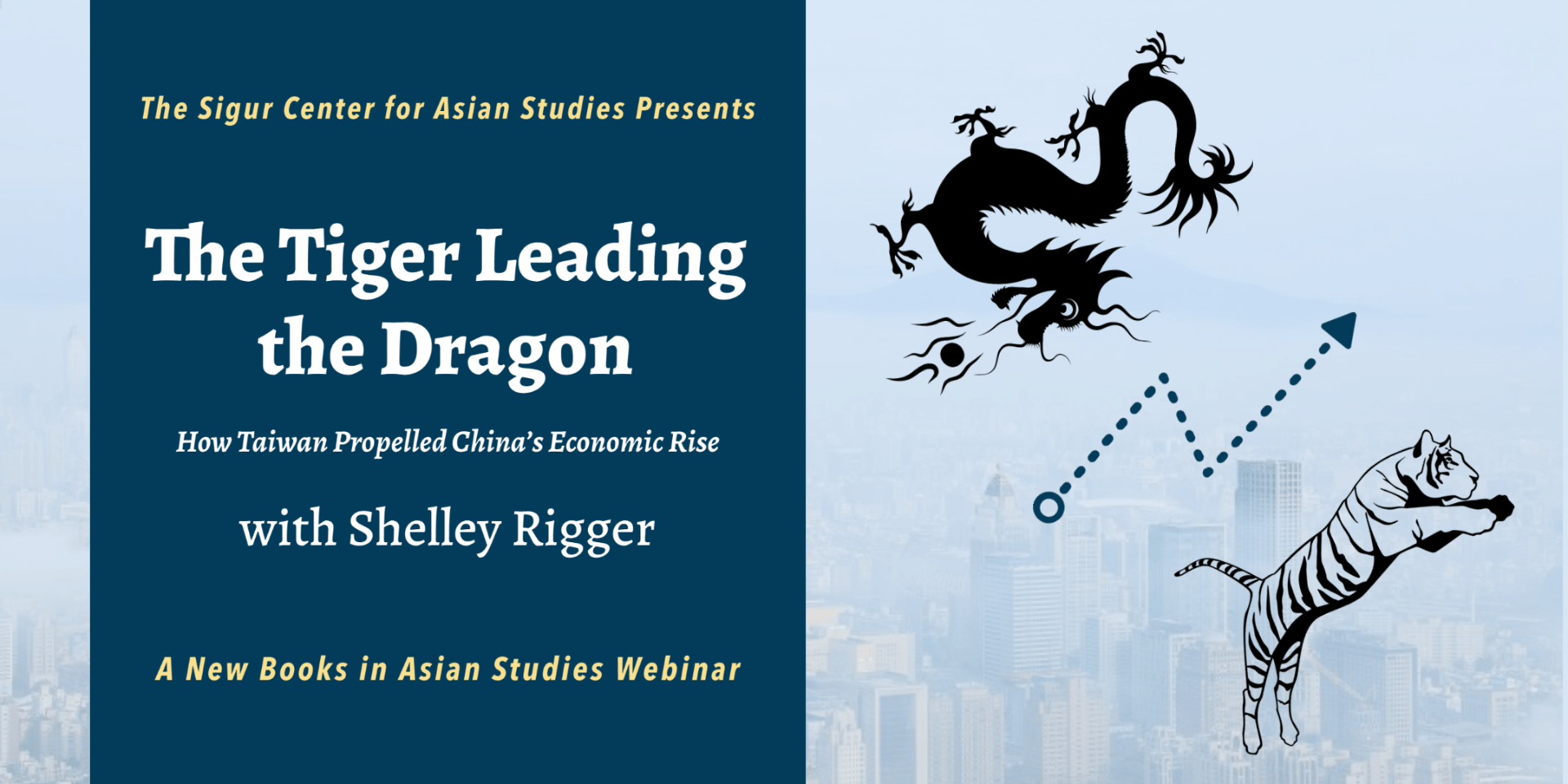Thursday, September 30, 2021
11:30 AM – 12:45 PM EDT
WebEx Events
The Sigur Center for Asian Studies will host Dr. Shelley Rigger to launch her new book, The Tiger Leading the Dragon: How Taiwan Propelled China’s Economic Rise as the sixth edition of the 2021 New Books in Asian Studies series. This event will also feature Richard Haddock, Program Associate at the East Asia National Resource Center, as a moderator.
Dr. Rigger’s new book discusses how the once-secretive, isolated People’s Republic of China became the factory to the world. Dr. Rigger convincingly demonstrates that the answer is Taiwan. She follows the evolution of Taiwan’s influence from the period when Deng Xiaoping lifted Mao’s prohibitions on business in the late 1970s, allowing investors from Taiwan to collaborate with local officials in the PRC to transform mainland China into a manufacturing powerhouse. After World War II, Taiwan’s fleet-footed export-oriented manufacturing firms became essential links in global supply chains. In the late 1980s, Taiwanese firms seized the opportunity to lower production costs by moving to the PRC, which was seeking foreign investment to fuel its industrial rise. Within a few years, Taiwan’s traditional manufacturing had largely relocated to the PRC, opening space for a wave of new business creation in information technology. The Tiger Leading the Dragon traces the development of the cross-Taiwan Strait economic relationship and explores how Taiwanese firms and individuals transformed Chinese business practices. It also reveals their contributions to Chinese consumer behavior, philanthropy, religion, popular culture, and law.

Shelley Rigger is the Brown Professor of East Asian Politics at Davidson College in Davidson, North Carolina. She has a PhD in Government from Harvard University and a BA in Public and International Affairs from Princeton University. She has been a visiting researcher at National Chengchi University in Taiwan (2005) and a visiting professor at Fudan University in Shanghai (2006). Rigger is the author of two books on Taiwan’s domestic politics: Politics in Taiwan: Voting for Democracy (Routledge 1999) and From Opposition to Power: Taiwan’s Democratic Progressive Party (Lynne Rienner Publishers 2001). She has published articles on Taiwan’s domestic politics, the national identity issue in Taiwan-China relations and related topics. Her current research studies the effects of cross-strait economic interactions on Taiwan people’s perceptions of Mainland China. Her monograph, “Taiwan’s Rising Rationalism: Generations, Politics and ‘Taiwan Nationalism’” was published by the East West Center in Washington in November 2006.

Richard J. Haddock is currently the Program Associate for the East Asia National Resource Center (NRC), which is supported by a Title VI grant from the U.S. Department of Education. In this role, Mr. Haddock is primarily responsible for East Asia learning content development, strategic planning and grant management, liaising with key community and educational stakeholders, and reporting to the Department of Education. He is also a member of the UC Berkeley U.S.-Taiwan Next Generation Working Group, where he is conducting a research project on the current state and future prospects of Taiwan Studies in the United States. He has held positions at the Sigur Center for Asian Studies, the National Democratic Institute’s Asia team, the American Institute in Taiwan’s Public Diplomacy Section, and the U.S. Department of State. Mr. Haddock is currently pursuing a Ph.D. in Public Policy and Public Administration at The George Washington University, focusing on digital democracy and e-governance development in the Asia-Pacific. He holds an M.A. in Asian Studies from the Elliott School, with a concentration on domestic politics and foreign policy of East Asia. He graduated from the University of Central Florida with a B.A. in Political Science and minors in Asian Studies and Diplomacy.




